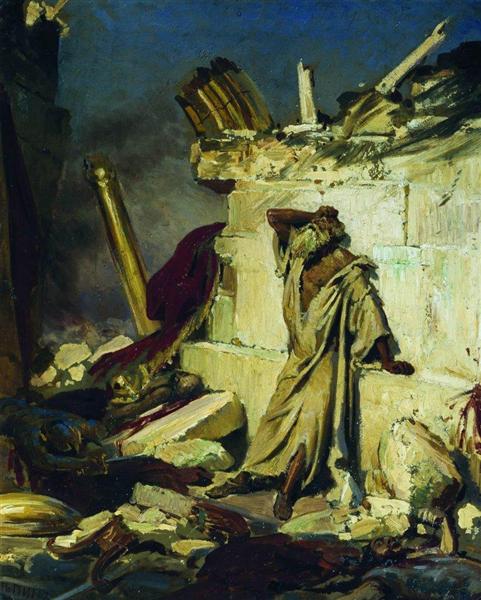Description
Ilya Repin's "The Cry of the Prophet Jeremiah over the Ruins of Jerusalem" created in 1870 is a powerful depiction of grief and hopelessness, set against a biblical backdrop that resonates with the human condition of loss and desolation. In this painting, Repin highlights not only his remarkable technical skill, but also his ability to capture the emotional anguish of his subjects, fostering a deep connection between the viewer and the subject matter.
At the centre of the composition is the prophet Jeremiah, whose figure stands with a painful robustness over the ruins of the city of Jerusalem. The prophet's posture is eloquent: his body, bent forward, manifests the weight of his lament, while his face, marked by an expression of deep sadness and despair, reflects the devastation that surrounds him. Repin employs a meticulous treatment of the features, which not only highlights Jeremiah's inner anguish, but also humanises his figure, allowing the viewer to share his suffering. The use of contrasts in the facial details and texture of Jeremiah's skin creates a sense of immediacy, capturing the essence of his spiritual torment.
The background is a barren and desolate landscape, where the ruins of Jerusalem are presented as a symbol of the devastating impact of war and betrayal. The treatment of the landscape is dark and gloomy, with earthy tones mixed with dull greys and browns, which intensifies the atmosphere of desolation. The architectural remains, looming through the misty days, seem to reflect the lost grandeur of the city, contrasting with the grief of the prophet, who is almost completely caught up in the drama of his own attitude and prayers.
Repin uses a reduced but expressive palette, in which dark tones predominate, reinforcing the sense of sadness that permeates the work. However, there are subtle variations of light that fall on Jeremiah and the ruins, suggesting the tenacious hope that often characterizes the artist's work. This struggle between light and darkness can be interpreted as a metaphor for the conflict between hope and despair, unavoidable components of human existence.
Repin's style is characteristic of Realism, an artistic movement that sought to depict everyday life and emotional truths in an honest and direct manner. His attention to detail, as well as his ability to evoke emotionality through his characters, ensure him a preeminent place in the history of Russian art. Comparing The Cry of the Prophet Jeremiah with other contemporary works by Repin, such as The Mocker and The Scapegoat, one perceives a continuity in the exploration of the human condition, as well as an unwavering commitment to the truthful representation of emotions.
The work not only highlights Repin's technical prowess and deep understanding of the human figure and its ability to convey complex emotions, but also fits into a broader context of the history of religious art and the interpretation of biblical themes. Repin succeeds in establishing a dialogue between the sacred and the everyday, between the historical and the contemporary, inviting the viewer to reflect on his or her own history and on the universality of suffering. Thus, "Cry of the Prophet Jeremiah over the Ruins of Jerusalem" stands as a monumental work that not only captures a moment of lament, but also invites a meditation on what it means to be human in a torn world.
KUADROS ©, a famous painting on your wall.
Hand-made oil painting reproductions, with the quality of professional artists and the distinctive seal of KUADROS ©.
Painting reproduction service with satisfaction guarantee. If you are not completely satisfied with the replica of your painting, we will refund 100% of your money.

